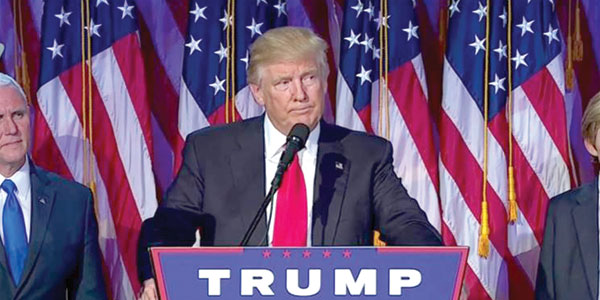
By Jorge Ramos
President Donald Trump is an imperfect head of state, to say the least. He has made sexist comments about women (some of which were infamously caught on tape), as well as racist remarks about Mexican, Haitian and African immigrants. He has made over 15,000 “false or misleading claims” since his inauguration, according to The Washington Post. He has mocked, bullied and insulted his political rivals. And recent congressional investigations have made it clear that he’s willing to do whatever it takes to win reelection.
Despite all these misdeeds, however, the most important question is whether Trump has done anything to warrant impeachment. For Democrats, the answer is that he absolutely has: On Dec. 18, the House of Representatives, currently controlled by Democrats, voted to approve two articles of impeachment against him.
The first article charges Trump with abuse of power. Democrats claim that when the president, in a July 25 phone call, said to Ukrainian President Volodymyr Zelenskiy that “I would like you to do us a favor,” he put his personal interests above those of the United States. At the time, the American government had withheld nearly $400 million in crucial military aid for Ukraine. In the call, Trump asked Zelenskiy to dig up damaging information on former Vice President Joe Biden and his son, Hunter. The elder Biden is one of Trump’s chief political rivals in the 2020 presidential race.
“It is an impeachable offense for the president to exercise the powers of public office to obtain an improper personal gain while ignoring or injuring the national interest,” said Rep. Jerrold Nadler, the chairman of the House Judiciary Committee, as he announced the charges against Trump.
The second article of impeachment alleges obstruction of Congress. “When the House investigated and opened an impeachment inquiry, President Trump engaged in unprecedented, categorical and indiscriminate defiance of the impeachment inquiry,” Nadler said.
The impeachment hearings have revealed that the president is prepared to do whatever it takes to get reelected. “We followed the president’s orders,” said Gordon Sondland, the U.S. ambassador to the European Union, during one of the hearings. Sondland acknowledged that he acted on Trump’s instructions when he pressured the Ukrainian government to investigate Biden, the president’s political rival.
The proposed quid pro quo worked like this: If the Ukrainian government announced an investigation into the Bidens, Kyiv would receive the military aid it needed and Zelenskiy himself would receive a much sought-after White House meeting with Trump.
The July 25 phone call, which Trump later called “perfect,” proved to serve as compelling evidence for congressional Democrats to finally impeach him. “The president leaves us no choice but to act because he is trying to corrupt, once again, the election for his own benefit,” said Rep. Nancy Pelosi, the Democratic speaker of the House. Pelosi believes, as do many of Trump’s critics, that he won the 2016 presidential election with help from Russia and that he intended to do the same again in 2020 with the help of Ukraine.
The politics, however, continue to favor the president. The Republican-controlled Senate will almost certainly acquit Trump on the impeachment charges approved by the Democratic House.
So why did the Democrats impeach now, instead of leaving voters to decide Trump’s fate in the next election on Nov. 3, 2020?
Rep. Adam Schiff, chairman of the House Intelligence Committee, has so far provided the best response to this important question. To hold off on the impeachment, Schiff recently argued, would be tantamount to letting the president cheat again: “Why don’t you just let him cheat in one more election? Why not let him cheat just one more time? Why not let him have foreign help just one more time?”
Unless a political earthquake shakes the souls of a few Republican Senators, Trump will not be removed from office; instead, he will indeed get his way one more time.
It’s hard to tell how much the impeachment process will influence the 2020 election. Will voters forget about all this, the same way most turned a deaf ear to Trump’s sexism and racism in 2016?
When it comes to Trump, there’s no point in trying to make predictions. The truth is we get things wrong almost every time.
But ultimately I believe that neither history nor the American people will be so generous toward this president. Even if the Senate acquits him, Trump will forever bear a black mark: Americans will remember him as the president who lied, bullied and cheated his way to the White House.
_________________________________________________________________________________________
‘¿Dejamos a Trump hacer trampa?’
Donald Trump es un presidente muy imperfecto. Tanto, que muchos padres le advierten a sus hijos que no lo imiten. Trump ha expresado gravísimas opiniones sexistas —¿se acuerdan lo que dijo en el video del programa “Access Hollywood”?—; ha hecho comentarios racistas en contra de inmigrantes mexicanos, haitianos y africanos; ha mentido o dado información falsa más de 15.000 veces; insulta, se burla y le pone apodos a sus adversarios políticos, y, según la evidencia presentada recientemente en el congreso de Estados Unidos, está dispuesto a hacer cualquier cosa para reelegirse. A pesar de lo anterior, la pregunta es: ¿hizo algo para ser destituido? Muchos miembros del Partido Demócrata creen que sí. Por eso se aprobaron en el Congreso dos artículos para sacarlo del poder.
El primero es por abuso de poder. Cuando Trump, en una llamada telefónica el 25 de julio, le dijo al presidente de Ucrania, Volodímir Zelenski, “quisiera que nos hicieras un favor”, puso su interés personal por encima de los intereses de la nación, según la acusación formal. El gobierno de Estados Unidos retuvo casi $400 millones de dólares en ayuda militar a Ucrania antes de la llamada en la que Trump le pide al líder ucraniano que investigara al exvicepresidente Joe Biden, precandidato a la Presidencia por el Partido Demócrata y uno de sus principales adversarios políticos rumbo a las elecciones de 2020, y a su hijo Hunter.
“El primer artículo es por abuso de poder”, dijo el líder del comité judicial de la Cámara de Representantes, Jerrold Nadler, al anunciar los cargos contra Trump. “Es una ofensa de destitución que el Presidente utilice su poder público para obtener un beneficio personal, mientras ignora o afecta el interés nacional”.
La segunda acusación es por obstruir el trabajo investigativo del Congreso. “Cuando el Congreso investigó e inició un proceso de destitución, el presidente Trump desafió de manera categórica, indiscriminada y sin precedentes la investigación”, explicó Nadler.
Las audiencias del proceso de destitución dejaron al descubierto a un Presidente dispuesto a hacer lo que sea para reelegirse en 2020. “Seguimos las órdenes del Presidente”, dijo Gordon Sondland, el embajador de Estados Unidos ante la Unión Europea, en una de las audiencias. Sondland reconoció haber presionado a los ucranianos, por instrucciones de Trump, para que investigaran a uno de sus rivales políticos. La propuesta de intercambio de favores fue así: si el gobierno ucraniano anunciara una investigación contra los Biden, el país recibiría la ayuda militar que estaba necesitando y Zelenski mismo conseguiría una reunión con Trump en la Casa Blanca que estaba queriendo.
Lo que para Trump fue una llamada “perfecta”, para los Demócratas en el congreso es la prueba más fuerte para destituirlo. “El Presidente no nos deja más alternativa que actuar, está tratando de corromper la elección, en su propio beneficio, una vez más”, dijo Nancy Pelosi, la presidenta de la Cámara de Representantes. Esta declaración refleja la visión de que Trump ganó la elección presidencial de 2016 con la ayuda de Rusia y que pretendía hacerlo en 2020, otra vez, con la ayuda de Ucrania.
Todo es político. La decisión de la Cámara de Representantes —controlada por los Demócratas— de enjuiciar al Presidente seguramente será rechazada en el Senado, donde domina el Partido Republicano, el partido de Trump. Todo parece indicar que, al final, Trump no será destituido. Entonces, ¿por qué no esperar a que los electores decidan qué hacer con Trump en las elecciones del 3 de noviembre de 2020?
La respuesta más clara a esa pregunta vital es de Adam Schiff, el líder del Comité de Inteligencia, que realizó la investigación sobre Ucrania: el momento de actuar es ahora, porque no hacer nada le permitiría a Trump hacer trampa una vez más. “¿Por qué no lo dejamos engañarnos otra vez? ¿Por qué no dejamos que reciba ayuda extranjera una vez más?”
A menos de que ocurra un terremoto político que sacuda el alma de un puñado de Republicanos en el Senado, Trump no será destituido y se saldrá con la suya una vez más. Es difícil saber qué tanto efecto tendrá el juicio de destitución en las elecciones presidenciales de Estados Unidos en 2020. ¿Se olvidarán de esto sus votantes, así como la mayoria de ellos ignoró en 2016 sus comentarios sexista y racistas?
Es inútil jugar a las predicciones con Trump. Casi siempre nos equivocamos. Pero dudo que la historia y los estadounidenses serán generosos con él. Aunque el Senado lo absuelva, a Trump siempre le dolerá que la gente lo recuerde como el Presidente que ganó mintiendo, insultando y haciendo trampas.









